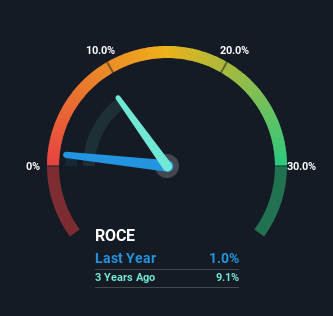- United States
- /
- Food and Staples Retail
- /
- NYSE:UNFI
United Natural Foods' (NYSE:UNFI) Returns On Capital Tell Us There Is Reason To Feel Uneasy
When it comes to investing, there are some useful financial metrics that can warn us when a business is potentially in trouble. Businesses in decline often have two underlying trends, firstly, a declining return on capital employed (ROCE) and a declining base of capital employed. Ultimately this means that the company is earning less per dollar invested and on top of that, it's shrinking its base of capital employed. And from a first read, things don't look too good at United Natural Foods (NYSE:UNFI), so let's see why.
What Is Return On Capital Employed (ROCE)?
Just to clarify if you're unsure, ROCE is a metric for evaluating how much pre-tax income (in percentage terms) a company earns on the capital invested in its business. The formula for this calculation on United Natural Foods is:
Return on Capital Employed = Earnings Before Interest and Tax (EBIT) ÷ (Total Assets - Current Liabilities)
0.01 = US$55m ÷ (US$7.6b - US$2.3b) (Based on the trailing twelve months to April 2024).
Therefore, United Natural Foods has an ROCE of 1.0%. In absolute terms, that's a low return and it also under-performs the Consumer Retailing industry average of 10%.
View our latest analysis for United Natural Foods

Above you can see how the current ROCE for United Natural Foods compares to its prior returns on capital, but there's only so much you can tell from the past. If you'd like, you can check out the forecasts from the analysts covering United Natural Foods for free.
How Are Returns Trending?
There is reason to be cautious about United Natural Foods, given the returns are trending downwards. Unfortunately the returns on capital have diminished from the 3.9% that they were earning five years ago. And on the capital employed front, the business is utilizing roughly the same amount of capital as it was back then. Companies that exhibit these attributes tend to not be shrinking, but they can be mature and facing pressure on their margins from competition. So because these trends aren't typically conducive to creating a multi-bagger, we wouldn't hold our breath on United Natural Foods becoming one if things continue as they have.
The Key Takeaway
In the end, the trend of lower returns on the same amount of capital isn't typically an indication that we're looking at a growth stock. But investors must be expecting an improvement of sorts because over the last five yearsthe stock has delivered a respectable 91% return. In any case, the current underlying trends don't bode well for long term performance so unless they reverse, we'd start looking elsewhere.
If you want to continue researching United Natural Foods, you might be interested to know about the 1 warning sign that our analysis has discovered.
While United Natural Foods may not currently earn the highest returns, we've compiled a list of companies that currently earn more than 25% return on equity. Check out this free list here.
New: AI Stock Screener & Alerts
Our new AI Stock Screener scans the market every day to uncover opportunities.
• Dividend Powerhouses (3%+ Yield)
• Undervalued Small Caps with Insider Buying
• High growth Tech and AI Companies
Or build your own from over 50 metrics.
Have feedback on this article? Concerned about the content? Get in touch with us directly. Alternatively, email editorial-team (at) simplywallst.com.
This article by Simply Wall St is general in nature. We provide commentary based on historical data and analyst forecasts only using an unbiased methodology and our articles are not intended to be financial advice. It does not constitute a recommendation to buy or sell any stock, and does not take account of your objectives, or your financial situation. We aim to bring you long-term focused analysis driven by fundamental data. Note that our analysis may not factor in the latest price-sensitive company announcements or qualitative material. Simply Wall St has no position in any stocks mentioned.
Have feedback on this article? Concerned about the content? Get in touch with us directly. Alternatively, email editorial-team@simplywallst.com
About NYSE:UNFI
United Natural Foods
Engages in the distribution of natural, organic, specialty, produce, and conventional grocery and non-food products in the United States and Canada.
Undervalued with moderate growth potential.
Similar Companies
Market Insights
Community Narratives




